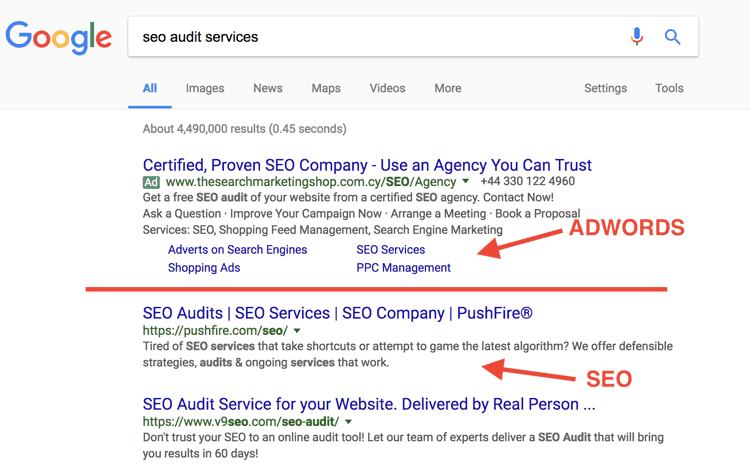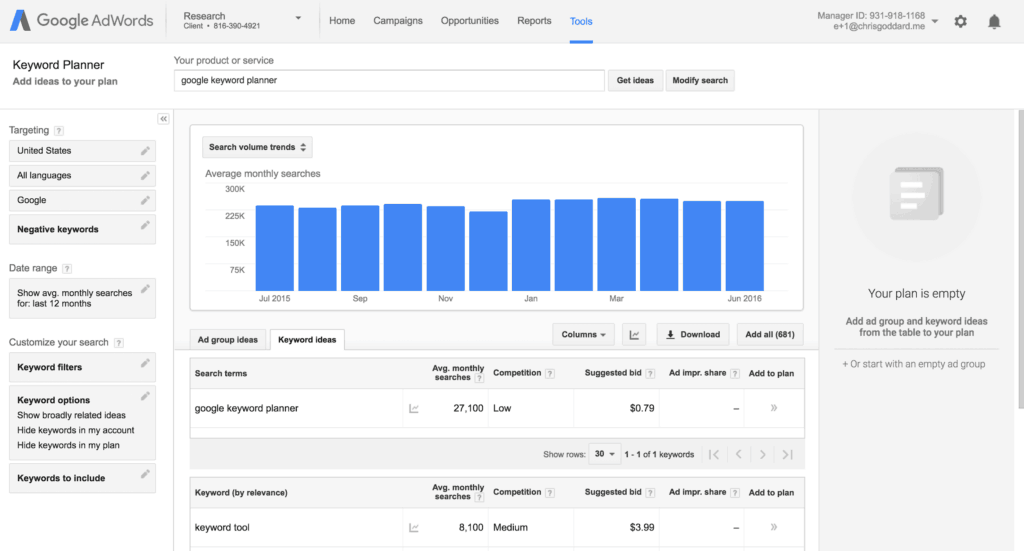SEO
Free SEO Analysis
SEO Services
Content Marketing Services
Local SEO
Link Building Services
Specialized SEO Services
PPC
REPUTATION MANAGEMENT
Free Reputation Management Analysis
Reputation Management Services
Review Management Services
Specialized Reputation Management Services
CEO Reputation Management
Brand Enhancement
Business and Directory Listings
Comprehensive Reputation Management Audit
SOCIAL MEDIA
Free Social Media Analysis
Specialized Social Services
WEB DEVELOPMENT
Free Website Analysis
Web Design Services
Mobile Development Services
Website Maintenance Services
Specialized Development Services
MARKETING AUTOMATION
Free Marketing Automation Analysis
Specialized Marketing Automation Services
Comprehensive Marketing Automation
INDUSTRIES
ABOUT DMA
SEO
SEO and SEM: Understanding Their Differences and Strengths
Request a quote
Its Fast, Easy & Free
Executive Summary
- SEM is a broader term than SEO and includes some additional methods of gaining search engine traffic.
- Even though SEO is usually viewed as a form of marketing, the truth is that every website needs this form of optimization.
- SEO isn’t superior to SEM; it does different things at a different pace, and the fact that it is still a popular marketing approach is a clear indicator that it provides value to the people using it.
The internet offers quite a few options for advertising and ultimately getting traffic. All the different techniques, approaches, and methods fall under the umbrella of internet marketing. There are a lot of advertising approaches within the sphere of internet marketing, which is why it can be difficult for people new to this to understand and adapt to the situation.
Search engines are the starting point for most users online, and this makes them the biggest traffic accumulators. It’s only natural that most businesses would like to tap into this traffic to reach new customers.
Both SEO and SEM are intended to help businesses get a piece of that search engine traffic, but what’s the difference between them? Let’s dig in.
SEM encompasses SEO

SEM (search engine marketing) includes all legitimate approaches for getting traffic to your website via search engines. One of the things SEM is focused on is SEO (search engine optimization), which itself is focused on optimizing rankings in search engine queries through non-manipulative methods — in other words, it goes after organic traffic through methods not deemed as manipulation by search engines.
SEO and SEM: One is a necessity, the other is not
Even though SEO is usually viewed as a form of marketing, the truth is that every website needs this form of optimization. Regardless of your ambitions to promote your website through other means, SEO is there to ensure that your website is indexed (not marked as spam) so people can find it when they search for it or the terms it is related to. The better the optimization, the bigger the chances your site will rank high in SERP (search engine result pages) for your target keyword and ultimately reach your desired audience.
SEM does the same, but it also includes using paid solutions to reach search engine traffic.
What does SEO do? (SEO Methodology)
The problem with SEO is that nobody can really guarantee a particular result. The algorithms search engines use are kept secret to avoid manipulation and to protect the integrity of their SERPs. Still, there are some guidelines you can rely on when doing SEO. Advanced SEO methods tend to be case-related or attributed to a style of a particular marketer, which he or she developed through extensive testing and experimentation.
The two basic categories upon which SEO is built are :
On-Site Optimization
Keywords
Content
Metadata
Site speed
URL Structure
Markup use
On-site links (internal and external)
Off-Site Optimization
Backlinks
Local SEO
Guest posting
Social media marketing
Influencer marketing
Basically, the point of SEO is to provide search engines with information about the content and website function, as well as its value to the inquiring users. After this, search engines will rank the particular website or its content to a particular position in SERPs for relevant queries.
There are statistical facts that show us exactly why SEO is so important. At the bare minimum, 75% of all SERP traffic is retained to the first page. The first position gets somewhere around 30% of that traffic, the second around 15%, the third 9%, and the rest share significantly smaller chunks of traffic.
[https://youtu.be/gJ9Xt5PohgU]
This means that, in theory, if a particular query gets 1,000 visitors, and if you are ranking first, you would get somewhere around 300 visitors to your website. That’s huge!
While all this may seem great, you have to understand the first position ranking of almost any query is difficult and can take years. SEO is something you do continuously over time and reap the benefits down the line. Still, once you start ranking well, the position is yours for as long as you remain the most relevant result (which usually doesn’t change overnight).
What does SEM do? (SEM Methodology)
As we already stressed, SEM is a broader term than SEO and includes some additional methods of gaining search engine traffic. You can use regular paid channels to get ad placements, not rankings, within search engines. They are charged on a PPC (pay per click) basis in order to ensure that companies pay only for the exposure that gets them traffic.
Still, not all PPC falls under SEM. Facebook ads are also PPC, but this is very different from search engine marketing. Facebook ads are introduced to people while they are browsing their feed, reading messages, and so on. SEM ads, on the other hand, are displayed to people who have searched for something specific and therefore are inclined to be interested in what the advertised party has to offer.
Keywords are very important for SEM and SEO
[https://youtu.be/zFeOCCRpk8s]
Extensive keyword research is usually required in order to organize and run a successful SEM campaign. We know that keywords are important for SEO, but why are they important for paid advertising on search engines? Well, they are the basic tool you use to find the queries your target is interested in.

Using keywords in PPC is crucial, and there are two factors you need to look into when doing this.
Volume:
This is the number of queries attributed to a particular keyword over a period of time. Time is included as a factor in order to provide marketers with a better picture of how much volume a particular keyword has.
Competitiveness:
This metric shows how much competition marketers face when bidding for a particular keyword. The bigger the competition, the more money a marketer has to dish out per click.
One big factor when picking the keywords to target is keyword seasonality. Not all keywords will have a consistent search volume throughout the year. For example, the keyword phrase “Christmas presents” is going to have very few queries during the summer but, come winter (or even autumn), you can expect it to rack up traffic like crazy.
Be careful which keywords you pick since they affect everything from your ads’ relevance and how many people convert to the price you pay for a single ad click.
CPC (Cost-per-click)
Finally, we can’t really talk about SEM and not touch the subject of the price. CPC or cost-per-click is a big factor in this approach since it limits you to how many clicks you can get within your budget. A bunch of factors can affect CPC, such as:
Your bid
Competitiveness
Quality score
Seasonality
This is where things become tricky. You need to be really careful when calculating your ROI (return on investment). If your clicks end up converting less than you intended, you stand to lose money. Still, few people get it right on the first try and, as with most marketing approaches, it takes some testing and experimentation to find what works for your particular situation.
SEO vs SEM: Which one is better?
Well, that all depends on what you’re trying to do and how much money you want to spend.
SEO is a long-term investment (and don’t be confused, it isn’t free unless you intend to be a one-man army) that is focused on putting your website in a better position naturally. Still, this will take some time to achieve and even more time to reap its benefits.
SEM offers you a way to reach exactly the traffic you are searching for, but this traffic may end up costing you a lot. Still, in some cases, it beats leaving your online presence in limbo while you strive to rank it well and get that organic traffic. In some situations, doing PPC and SEM can help you identify the best queries you might want to attempt to rank for naturally by using SEO. If you’re asking about the difference between SEO and PPC that’s a whole other story.
If you want a clear winner, we would have to go with SEO just because it is an essential rather than the optional approach of SEM. Still, SEO isn’t superior to SEM; it does different things at a different pace, and the fact that it is still a popular marketing approach is a clear indicator that it provides value to the people using it. Considering they both focus on getting traffic from search engines, if one were superior, the other would have become obsolete by now and put out of use.
We hope this help you understand the differences between SEO and SEM, as well as their uses, strengths, and weaknesses. Feel free to post your questions below. What is your experience with SEM and SEO, and how did their effectiveness compare to each other? Do you do both or just one? Also, if you have the time, fill out the form below. It would mean a lot to us. Have a great day!
Our Sales team